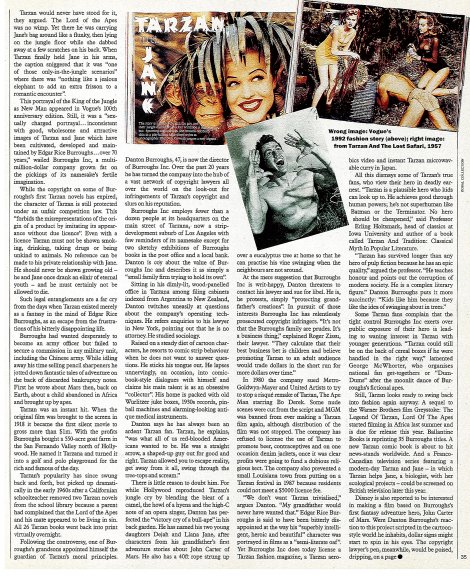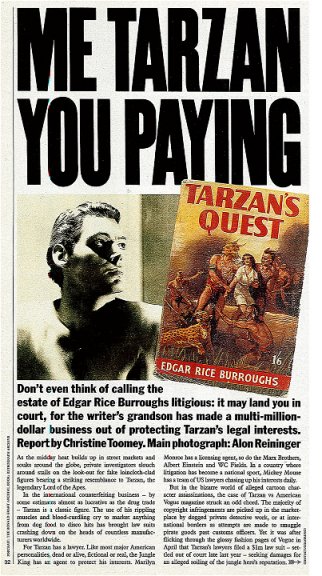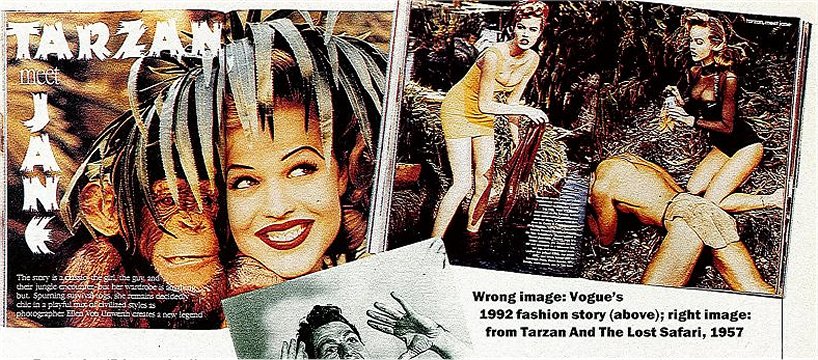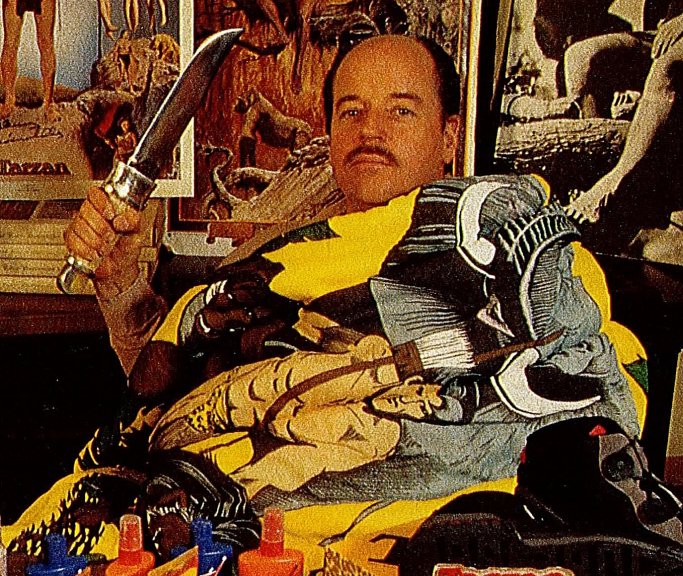 Tarzan
would never have stood for it, they argued. The Lord of the Apes was no
wimp. Yet there he was carrying Jane's bag around like a flunky, then lying
on the jungle floor while she dabbed away at a few scratches on his back.
When Tarzan finally held Jane in his arms, the caption sniggered that it
was "one of those only-in-the-jungle scenarios" where there was nothing
like a jealous elephant to add an extra frisson to a romantic encounter."
Tarzan
would never have stood for it, they argued. The Lord of the Apes was no
wimp. Yet there he was carrying Jane's bag around like a flunky, then lying
on the jungle floor while she dabbed away at a few scratches on his back.
When Tarzan finally held Jane in his arms, the caption sniggered that it
was "one of those only-in-the-jungle scenarios" where there was nothing
like a jealous elephant to add an extra frisson to a romantic encounter."
This portrayal of the King of the Jungle as New Man appeared in Vogue's
100th anniversary edition. Still, it was a "sexually charged portrayal
. . . inconsistent with good, wholesome and attractive images of Tarzan
and Jane which have been cultivated by Edgar Rice Burroughs . . . over
70 years," wailed Burroughs Inc., a multi-million-dollar company grown
fat on the pickings of its namesake's fertile imagination.
While the copyright on some of Burroughs's first Tarzan novels has expired,
the character of Tarzan is still protected under an unfair competition
law. This "forbids the misrepresentations of the origin of a product by
imitating its appearance without due licence." Even with a licence Tarzan
must not be shown smoking, drinking, taking drugs or being unkind to animals.
No reference can be made to his private relationship with Jane. He should
never be shown growing old -- he and Jane once drank an elixir of eternal
youth -- and he must certainly not be allowed to die.
Such legal entanglements are a far cry form the days when Tarzan existed
merely as a fantasy in the mind of Edgar Rice Burroughs, as an escape from
the frustrations of his bitterly disappointing life.
Burroughs had wanted desperately to become an army officer but failed
to secure a commission in any military unit, including the Chinese army.
While idling away his time selling pencil sharpeners he jotted down fantastic
tales of adventure on the back of discarded bankruptcy notes. First
he wrote about Mars then, back on Earth, about a child abandoned in Africa
and brought up by apes.
Tarzan was an instant hit. When the original film was brought to the
screen in 1918 it became the first silent movie to gross more than $1m.
With the profits Burroughs bought a 550-acre goat farm in the San Fernando
Valley north of Hollywood. He named it Tarzana and turned it into a golf
and polo playground for the rich and famous of the day.
Tarzan's popularity has since swung back and forth, but picked up dramatically
in the early 1960 after a Californian schoolteacher removed two Tarzan
novels from the school library because a parent had complained that the
Lord of the Apes and his mate appeared to be living in sin. All 26 Tarzan
books went back into print virtually overnight.
Following the controversy, one of Burroughs' grandsons appointed himself
the guardian of Tarzan's moral principles.
Danton Burroughs, 47, is now the director of Burroughs, Inc. Over the
past 20 years he has turned the company into the hub of a vast network
of copyright lawyers all over the world on the look-out for infringements
of Tarzan's copyright and slurs on his reputation.
Burroughs Inc. employs fewer than a dozen people at hits headquarters
on the main street of Tarzana, now a strip-development suburb of Los Angeles
with few reminders of its namesake except for two sketchy exhibitions of
Burroughs books in the post office and a local bank. Danton is coy about
the value of Burroughs Inc. and describes it as simply a "small family
firm trying to hold its own."
Sitting in his dimly-lit, wood-panelled office in Tarzana among filing
cabinets indexed from Argentina to New Zealand, Danton twitches uneasily
at questions about the company's operating techniques. He refers enquiries
to his lawyer in New York, pointing out that he is no attorney. He studied
sociology.
Raised on a steady diet of cartoon characters, he resorts to comic strip
behaviour when he does not want to answer questions He sticks his tongue
out. He lapses unnervingly, on occasion, into comic-book-style dialogues
with himself and claims his main talent is as an obsessive "collector."
His home is packed with old Wurlitzer juke boxes, 1930s records, pinball
machines and alarming-looking antique medical instruments.
Danton says he has always been an ardent Tarzan fan. Tarzan, he explains,
"was what all of us red-blooded Americans wanted to be. He was a straight
arrow, a shaped-up guy out for good and right. Tarzan allowed you to escape
reality, get away from it all, swing through the tree-tops and scream."
There is little reason to doubt him. For while Hollywood reproduced
Tarzan's jungle cry by blending the bleat of a camel, the howl of
a hyena and the high-C note of an opera singer, Danton has perfected the
"victory cry of a bull-ape" in his back garden. He has named his two young
daughters Dejah and Llana Jane, after characters from his grandfather's
first adventure stories about John Carter of Mars. He also has a 40 ft
rope strung up over a eucalyptus tree at home to that he can practise his
vine swinging when the neighbours are not around.
At the mere suggestion that Burroughs Inc. is writ-happy, Danton threatens
to contact his lawyer and sue for libel. He is, he protests, simply "protecting
grandfather's creations." In pursuit of those interests Burroughs Inc.
has relentlessly prosecuted copyright infringers. "It's not that the Burroughs
family are prudes. It's a business thing," explained Roger Zissu, their
lawyer. "They calculate that their best business bet is children and believe
promoting Tarzan to an adult audience would trade dollars in the short
run for more dollars over time."
In 1980 the company sued Metro-Goldwyn-Mayer and United Artists to try
to stop a risqué remake of Tarzan, The Ape Man starring Bo
Derek. Some nude scenes were cut from the script and MGM was banned from
ever making a Tarzan film again, although distribution of the film was
not stopped. The company has refused to license the use of Tarzan to promote
beer, contraceptives and on one occasion denim jackets, once it was clear
profits were going to fund a dubious religious sect. The company also prevented
on a Tarzan festival in 1987 because residents could not meet a $5000 licence
fee.
"We don't want Tarzan trivialized," argues Danton. "My grandfather would
never have wanted that." Edgar Rice Burroughs is said to have been bitterly
disappointed at the way his "superbly intelligent, heroic and beautiful"
character was portrayed in films as a "semi-literate oaf." Yet Burroughs
Inc. does today license a Tarzan fashion magazine, a Tarzan aerobics video
and instant Tarzan microwavable curry in Japan.
All this dismays some of Tarzan's true fans, who view their hero in
deadly earnest. "Tarzan is a plausible hero who kids can look up to. He
achieves good through human powers; he's not superhuman like Batman or
the Terminator. No hero should be cheapened," said Professor Erling Holtsmark,
head of classics at Iowa University and author of a book called Tarzan
And Tradition: Classical Myth In Popular Literature.
"Tarzan has survived longer than any hero of pulp fiction because he
has an epic quality," argued the professor. "He teaches honour and points
out the corruption of modern society. He is a complex literary figure."
Danton Burroughs puts it more succinctly: "Kids like him because they like
the idea of swinging about in trees."
Some Tarzan fans complain that the tight control Burroughs Inc. exerts
over public exposure of their hero is leading to waning interest in Tarzan
with younger generations. "Tarzan could still be on the back of cereal
boxes if he were handled in the right way," lamented George McWhorter,
who organises national fan get-togethers or "Dum-Dums" after the moonlit
dance of Burroughs's fictional apes.
Still, Tarzan looks ready to swing back into fashion again anyway. A
sequel to the Warner Brothers film Greystoke: The Legend of Tarzan,
Lord of the Apes started filming in Africa last summer and is due for
release this year. Ballantine Books is reprinting 35 Burroughs titles.
A new Tarzan comic is about to hit news-stands worldwide. And a Franco-Canadian
television series featuring a modern-day Tarzan and Jane -- in which Tarzan
helps Jane, a biologist, with her ecological projects -- could be screened
on British television later this year.
Disney is also reported to be interested in making a film based on Burroughs's
first fantasy adventure hero, John Carter of Mars. Were Danton Burroughs's
reaction to this project scripted in the cartoon-style world he inhabits,
dollar signs might start to spin in his eyes. The copyright layer's
pen, meanwhile, would be poised, dripping, on a page.




 Tarzan
would never have stood for it, they argued. The Lord of the Apes was no
wimp. Yet there he was carrying Jane's bag around like a flunky, then lying
on the jungle floor while she dabbed away at a few scratches on his back.
When Tarzan finally held Jane in his arms, the caption sniggered that it
was "one of those only-in-the-jungle scenarios" where there was nothing
like a jealous elephant to add an extra frisson to a romantic encounter."
Tarzan
would never have stood for it, they argued. The Lord of the Apes was no
wimp. Yet there he was carrying Jane's bag around like a flunky, then lying
on the jungle floor while she dabbed away at a few scratches on his back.
When Tarzan finally held Jane in his arms, the caption sniggered that it
was "one of those only-in-the-jungle scenarios" where there was nothing
like a jealous elephant to add an extra frisson to a romantic encounter."

